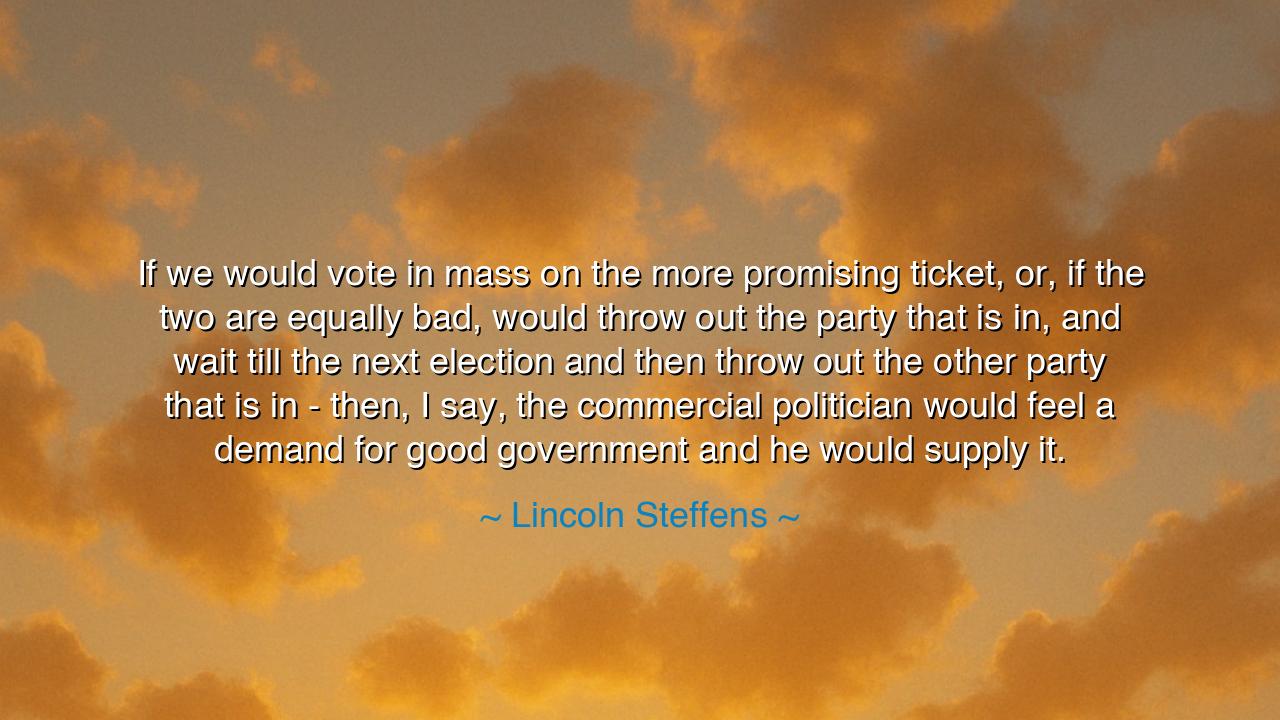
If we would vote in mass on the more promising ticket, or, if the
If we would vote in mass on the more promising ticket, or, if the two are equally bad, would throw out the party that is in, and wait till the next election and then throw out the other party that is in - then, I say, the commercial politician would feel a demand for good government and he would supply it.






In the age of corruption and awakening, when the gilded towers of power gleamed above the hunger of the streets, the great reformer Lincoln Steffens spoke these words like a trumpet to the sleeping conscience of the people:
"If we would vote in mass on the more promising ticket, or, if the two are equally bad, would throw out the party that is in, and wait till the next election and then throw out the other party that is in — then, I say, the commercial politician would feel a demand for good government and he would supply it."
This is no idle complaint, but the cry of a prophet who had walked among the rot of the Gilded Age, who had seen cities ruled not by citizens but by syndicates, and governments sold like wares in a marketplace. Steffens, who called himself “the muckraker,” spoke these words not from theory, but from the ashes of hope — after seeing how easily the people, weary or cynical, surrendered their power to those who bartered public duty for private gain. His words are both rebuke and revelation: that the cure for corruption lies not in leaders, but in the will of the governed.
He tells us plainly that the people themselves are the architects of their bondage. When voters cling to party over principle, when they excuse evil because it wears their color or sings their song, then corruption thrives unchallenged. The “commercial politician”, that dealer in promises and favors, listens not to conscience, but to demand — and if the people demand nothing but loyalty to party, he will supply them with deceit wrapped in slogans. But if they rise in unity, cast aside their idols, and strike fear into the hearts of the complacent, then — and only then — will he trade corruption for reform.
Steffens’ wisdom was forged in the fires of the early twentieth century, when the smoke of industrial greed choked the lungs of democracy. Cities like New York, Chicago, and Philadelphia were ruled by machines — political cartels that sold votes, licenses, and justice. Men like Boss Tweed in New York turned the sacred art of governance into a business of theft. Yet these tyrants did not rise alone. They were lifted by the apathy of the people, who, divided or indifferent, gave them power through neglect. Steffens saw this truth and wrote with righteous fury: “The misgovernment of the American people is misgovernment by the American people.”
The heart of his message is both humbling and heroic: that democracy is not a spectator’s art, but a covenant that demands participation and vigilance. Freedom cannot be preserved by worshiping parties or personalities; it can only endure through the moral courage of citizens who demand better and refuse to settle for less. Steffens’ remedy is not complex — it is simple, yet difficult, for it asks the people to turn their frustration into action, their cynicism into resolve. When he says to “throw out the party that is in,” he is not calling for chaos, but for accountability — that every ruler must know his seat is held not by right, but by the grace of the people’s trust.
History itself bears witness to this principle. In the days of the Roman Republic, when senators grew rich from the spoils of empire and the people grew weary of endless deceit, the reformers known as the Gracchi brothers rose to demand justice. They were cut down, but their cry endured: that power must never rest too long in the same hands, lest it decay into tyranny. Steffens’ vision is the same in spirit — that democracy, if it is to live, must breathe through renewal, through the fearless act of the people reclaiming their own power again and again.
Yet this teaching is not only political — it is spiritual. It speaks to every realm of human life where authority grows comfortable and conscience grows quiet. Complacency is the seed of corruption, whether in government, in faith, or in the heart. Just as a garden must be tended to keep weeds from overrunning it, so too must a democracy be pruned and renewed by those who love it. The act of voting, in Steffens’ vision, is not a chore, but a ritual — the citizen’s oath to hold truth above tribe, and the common good above convenience.
So take this lesson, O heirs of liberty: if the world seems ruled by the corrupt, look first to your own courage. Do not surrender your vote to despair, nor your conscience to comfort. Throw out the party that forgets its people. Demand better. Wait, and strike again if needed. For only through the steady, relentless insistence of the governed will the governors remember their duty.
Thus ends the teaching: A nation’s purity is not in its flag nor in its wealth, but in the vigilance of its people. Let the rulers fear complacent citizens no more — let them fear the awakened multitude, who vote not as partisans, but as guardians of justice. For when the people demand good government, even the corrupt will learn to supply it.






AAdministratorAdministrator
Welcome, honored guests. Please leave a comment, we will respond soon